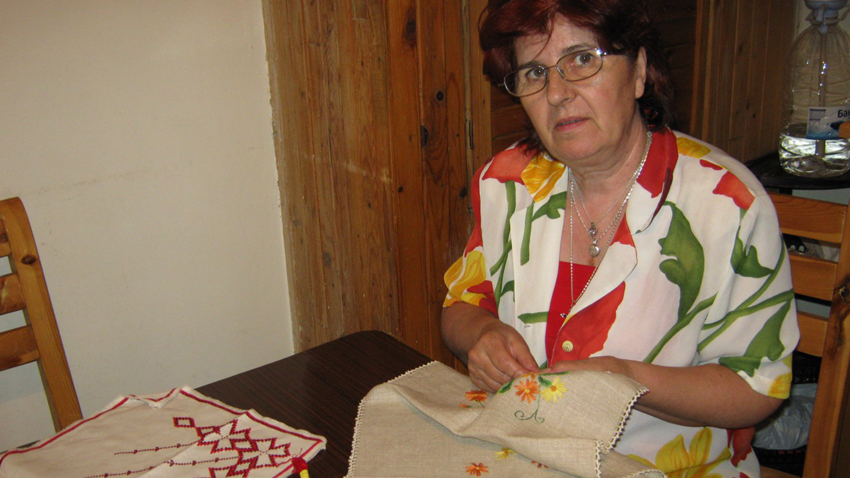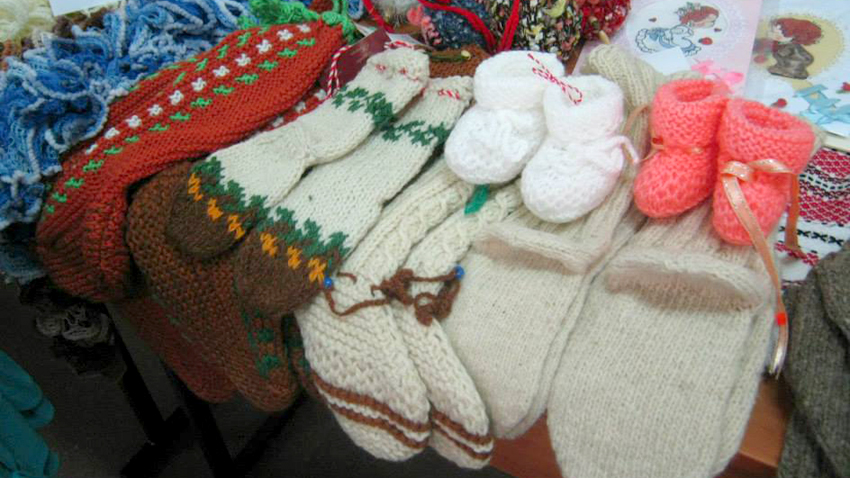Colorful souvenirs, sophisticated jewels, refined embroidery, handmade knitting, textile dolls and unique woodcarving pieces: such beautiful items are often the work of the army of homeworkers in Bulgaria. Their number is estimated at about 450,000. „78 percent of them are women and they are employed in the light industry”, says Violeta Zlateva, Chairperson of both the Association of Homeworkers in Bulgaria and of the trade union of the self-employed and informal workers. Until a few years ago homeworkers were recruited mostly from the ranks of retirees, but today their average age is lower and there are many persons with higher education among them who have turned their hobby into a job. The Association reports about lawyers, economists and teachers turned homeworkers after losing office jobs. Mrs. Zlateva explains that their numbers have been constantly rising:
 „Apart from homeworkers, there has been a rise in the numbers of informal agricultural workers and of street vendors. In Sofia there are issues with street musicians who are also part of the informal workers. There are many disabled persons who are homeworkers or working in the grey sector of the economy.”
„Apart from homeworkers, there has been a rise in the numbers of informal agricultural workers and of street vendors. In Sofia there are issues with street musicians who are also part of the informal workers. There are many disabled persons who are homeworkers or working in the grey sector of the economy.”
According to the representatives of the Association homeworkers continue to be invisible and deprived of basic rights and representation. Most people enter the grey economy out of need, not by choice. For them this is a matter of survival. „The ones who do piecemeal jobs are paid remuneration but without any contracts and social security contributions”, Mrs. Zlateva explains. So the Association wants to share control with the Labor Inspection. To enable them to quit the grey economy, the social security margin of self-employed homeworkers should be lowered to the size of the minimum monthly salary, the Association contends.
Svetla Ilieva is from Pleven, Northern Bulgaria, and is an accountant. Fifteen years ago the woman lost her job and joined the army of homeworkers. She however admits that due to low and irregular incomes she has failed to pay social security contributions and hasn't got the required retirement record. For 12 years Svetla has been the coordinator of the Association of Homeworkers in Pleven:
„I lost my job and started working at home: knitting, embroidery, doll-making etc. With several women we joined forces and set up the local organization. There are no industries in Pleven apart from the sartorial industry. Close to 10,000 work in sartorial factories - the rest have emigrated. There are no jobs available. So we make souvenirs and organize bazaars in Pleven, Sofia and during the summer at the seaside to sell the produce.”

 Finding retail outlets to sell their produce is a problem that self-employed homeworkers often face. Usually it is expensive to hire outlets on markets and bazaars and they cannot afford this luxury. The mayors of Sofia, Burgas, Veliko Tarnovo and Pleven have been cooperative and have provided to them municipal premises in exchange for relatively low rents. Besides homeworkers have no access to financing and trainings.
Finding retail outlets to sell their produce is a problem that self-employed homeworkers often face. Usually it is expensive to hire outlets on markets and bazaars and they cannot afford this luxury. The mayors of Sofia, Burgas, Veliko Tarnovo and Pleven have been cooperative and have provided to them municipal premises in exchange for relatively low rents. Besides homeworkers have no access to financing and trainings.
„We want to include self-employed homeworkers in special programs for the development of their own small businesses but not under the current terms”, Mrs. Zlateva says. “There are ongoing programs but one requirement for micro-financing is a turnover of at least 300,000 (150,000 euro) leva for the past three years. There is hardly a single self-employed homeworker in Bulgaria with such a turnover. We demand specialized entrepreneurship programs. People need financing to the tune of 5 to 6 thousand euro to be able to start their own businesses and buy materials”, concludes Violeta Zlateva, Chairperson of the Association of Homeworkers in Bulgaria and of the trade union of the self-employed and informal workers.
English Daniela Konstantinova
Photos by courtesy of the Association of Homeworkers in Bulgaria
There is no exact statistic on the number of Bulgarians living abroad, but a report from the Ministry of Foreign Affairs from last year indicates that around 2.8 million Bulgarians are living outside the country . According to the 2021 population census..
The nature protection organization WWF - Bulgaria is launching a campaign entitled "Subscribe to Nature". The disappearance of wild animals is a series in which we play the main role. In less than one human lifetime, 73% of vertebrates in..
The Embassy of France and the French Cultural Institute brought together scientists to present their experience and the scientific challenges in Antarctica, as well as the fight against climate change. Partners of the event were the..
Over 3.5 million Ukrainians have arrived in or passed through Bulgaria since the beginning of the war. Nearly 200,000 people have found temporary..
At the Bulgarian Embassy in London, Prof. Bettany Hughes presented excerpts from the new BBC series - Wonders of Bulgaria. Prof. Bettany..
An innovation for the treatment of diabetic foot ulcer using the patient's own tissue and artificial intelligence has been implemented at the University..

+359 2 9336 661
